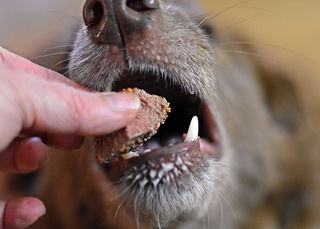Appetite
Is Your Dog a Stress-Eater?
A new paper examines emotional eating in companion dogs
Posted March 27, 2018

Food and feelings are intimately intertwined, often in ways that challenge our well-being and our waistlines. Emotional eating, or “stress eating,” is when we use eating to soothe negative emotions. When Bridget Jones plops down on the couch with a huge tub of ice cream after her latest emotional love-disaster, this is just what she’s doing—and the reason we find it funny and endearing is that many of us can relate. Negative mood can increase the motivation to eat, particularly “comfort foods” which are high in sugar and fat. If we stress eat too often, we gain unwanted weight. And humans, it seems, are not alone. Emotional eating has also been implicated in the epidemic of obesity in our companion dogs and cats. It is well worth thinking carefully about food-feeling interconnections in our companion animals and a new study being published in the Journal of Veterinary Behavior helps us do just this.
A paper by Isabel Luño and colleagues explores emotional eating in companion dogs. Luño and her colleagues surveyed over 1000 dog owners on various aspects of feeding habits, eating behaviors, and emotional state in their dogs, aiming to see whether owners perceive connections between emotions and eating behaviors. Strikingly, more than 80% of owners attributed some level of emotional eating to their dog, and quite a few (about 40%) rated the intensity of emotional eating as high or very high.
Several variables appeared to be related to emotional eating. Dogs perceived as emotional eaters were also perceived as being unhappy or dependent. Many refused to eat when their owner wasn’t present; many had been diagnosed with a medical condition; many had what the owners perceived as behavioral problems; and emotional eating seemed to correlate with particular feeding habits established by the dog owner such as once-a-day meals and inclusion of homemade food.
Here are the two main take-aways from this study:
- Compromised mental health may be an important risk factor for obesity in dogs. If a dog is overweight, it may be a sign that his or her psychological quality of life is not as good as it could be or should be.
- In treating obesity in dogs, we need to take into consideration the role of emotions. We can look for ways to treat the underlying causes of emotional eating by addressing sources of stress and anxiety (e.g., being left alone for long periods of time; exposure to stressful noises or stimuli; boredom; punishment-based training). Restricting access to food may not be the ideal strategy for helping overweight dogs, since restricting access may increase a dog’s level of stress and thereby also increase the dog’s motivation to eat.
Of course, Luño and colleagues have investigated the perceptions of dog owners, which may or may not accurately reflect what is happening for the dogs themselves. Using owner-directed questionnaires to assess canine behavior is relatively common, building on the assumption that the strong emotional bond between owner and dog gives the owner good insight into the dog's feelings and behaviors. That said, Luño and her colleagues admit that 25% of owners in their survey were not sure whether their dog was overweight because they didn't know what a healthy weight for their dog would look like. Nevertheless, the findings are important and suggest a need for further research. Emotional eating is one small piece of a much broader and fascinating realm of eating behaviors in dogs—an area that is in urgent need of greater attention.
Veterinarian Frank McMillan suggested in a 2013 paper, also in the Journal of Veterinary Behavior, that emotional eating may be an important welfare concern for pets, including dogs, who generally experience higher levels of emotional distress than most pet owners realize. We can, he said, use emotional eating as a sign that an animal may be experiencing negative emotions; likewise, we can more successfully treat problems of obesity and overweight in pets by taking into consideration the role of food and eating behaviors and the relationships between feelings and food. McMillan’s paper was (as far as I know) the first exploration of emotional eating in companion animals. Luño and colleagues have now added some important nuance to our understanding of this issue, as it relates to dogs. We can be asking parallel questions about cats and other animals kept in the home.
In trying to better understand and care for our canine companions, we can become more observant of their relationship to food, their eating behaviors, and the connections between food and mood. We can pay attention to individual differences in food responsiveness, motivation, and fussiness. Other behaviors we can observe include time to finish a meal (more than half of the dogs in Luño’s study finished a meal in under 5 minutes!), voracity, changes in eating when owner is absent, aggression related to food protection, stealing food (e.g. counter surfing), pica (eating non-digestible items such a dirt or rocks), and coprophagia (eating feces). We can also be attentive to how eating behavior may change in response to illness or treatments for illnesses.

One of the quirkier findings from Luño’s study was that dogs who were given treats for no apparent reason also happened to be dogs for whom no emotional eating was reported by owners. I’m not sure we can draw any conclusions from this tidbit, but I’m going to use it as an excuse to get up and give my two very patient dogs a low-calorie biscuit.
References
Isabel Luño, Jorge Palacio, Sylvia García-Belenguer, Ángela González-Martínez, Belén Rosado. 2018. Emotional eating in companion dogs: owners’ perception and relation with feeding habits, eating behavior and emotional state. Journal of Veterinary Behavior, 2018. http://www.journalvetbehavior.com/article/S1558-7878(17)30143-0/fulltext
McMillan, Frank. 2013. Stress-induced and emotional eating in animals: A review of the experimental evidence and implications for companion animal obesity. Journal of Veterinary Behavior 8, 376-385.


